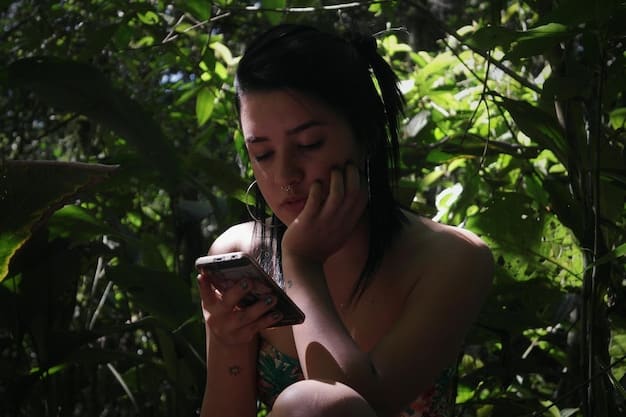Mindful Tech Detox: Reclaim Focus in 72 Hours

A mindful tech detox is a deliberate break from digital devices, like smartphones and computers, allowing you to reconnect with yourself and your surroundings, reducing digital fatigue and reclaiming your focus in as little as 72 hours.
Feeling overwhelmed by constant notifications and endless scrolling? A **mindful tech detox: 72 hours to reclaim your focus and reduce digital fatigue** can be the reset you need. Let’s explore how unplugging can transform your well-being.
Understanding Digital Fatigue and Its Impact
Before diving into the detox itself, it’s crucial to understand the problem: digital fatigue. This modern ailment affects millions, impacting our mental and physical health. Recognizing the causes is the first step to overcoming them.
What is Digital Fatigue?
Digital fatigue is a state of mental and physical exhaustion caused by the overuse of digital devices and constant exposure to information. It’s more than just feeling tired; it affects your cognitive functions and emotional well-being.
Common Symptoms of Digital Fatigue
The symptoms can often be subtle, gradually worsening over time. Recognizing them early can help you take preventative measures before burnout sets in.
- Decreased attention span
- Difficulty concentrating
- Increased irritability and anxiety
- Sleep disturbances

The Long-term Effects on Your Mental Health
Untreated digital fatigue can have severe consequences for your mental health, as well as more subtle effects on your daily life.
- Increased risk of depression and anxiety disorders
- Chronic stress and burnout
- Impaired cognitive function
- Social isolation
Digital fatigue is a serious problem with far-reaching effects, but understanding its impact can help you start taking active steps toward reducing its influence in your life.
Preparing for Your 72-Hour Mindful Tech Detox
A successful tech detox requires thoughtful preparation. It’s not just about cutting yourself off from technology; it’s about creating a supportive environment and setting realistic expectations.
Setting Clear Intentions
Before you start, define your goals for the detox. What do you hope to achieve? Are you seeking more focus, reduced anxiety, or improved sleep?
Planning Your Tech-Free Activities
Don’t leave yourself with nothing to do. Plan activities that you enjoy and that will keep you engaged and entertained during your detox.
- Read a book or start a new hobby
- Spend time in nature
- Connect with friends and family in person
- Practice mindfulness and meditation
Informing Friends and Family
Let your loved ones know that you will be unavailable for a few days. This helps avoid unnecessary worry and ensures they respect your boundaries.
Proper preparation is key to a successful and fulfilling tech detox, which will increase your chances of completing the 72 hours, and benefit from the change.
Day 1: Disconnecting and Reconnecting with Yourself
The first day is often the most challenging. It’s when you’re most likely to experience withdrawal-like symptoms and feel the urge to check your devices.
Managing Initial Urges
Acknowledge the urge to check your phone, but don’t act on it. Instead, distract yourself with a planned activity or practice mindfulness techniques.
Mindful Activities to Replace Screen Time
Engage in activities that help you reconnect with yourself and your surroundings. Focus on being present in the moment, rather than dwelling on what you’re missing online.
- Take a walk in nature
- Practice yoga or meditation
- Journal your thoughts and feelings
Reflecting on Your Digital Habits
Use this time to reflect on your relationship with technology. What triggers your device use? What needs are you trying to fulfill by being online?
By the end of the first day, you’ll begin to feel more present and grounded as you start to reduce your reliance on technology.
Day 2: Embracing the Present Moment
As you move into the second day, you may find it easier to disconnect from technology. Focus on deepening your connection with yourself and your surroundings.
Deepening Your Mindfulness Practice
Continue practicing mindfulness techniques to stay grounded in the present moment. Pay attention to your breath, your senses, and your thoughts without judgment.
Engaging in Creative Activities
Explore activities that allow you to express yourself creatively. This could be anything from painting and writing to playing music or dancing.
Connecting with Nature
Spend time outdoors, immersing yourself in the natural world. Notice the sights, sounds, and smells around you, and allow yourself to be fully present in the experience.

Day two is about reinforcing your ability to find joy and engagement in activities that don’t involve screens, strengthening your resolve to complete the tech detox.
Day 3: Re-evaluating Your Relationship with Tech
By the final day of your detox, you should have a clearer understanding of your relationship with technology and how it impacts your life. Use this day to plan how you want to reintroduce technology into your routine.
Identifying Healthy Tech Boundaries
Think about the boundaries you want to set for yourself when you reconnect. How can you use technology in a way that supports your well-being, rather than detracts from it?
Creating a Sustainable Digital Diet
Develop a plan for managing your technology use in the long term. This might involve setting specific times for checking email, limiting social media use, or designating tech-free zones in your home.
Tools and Apps for Mindful Tech Use
When you’re ready to get back online, consider tools to help reinforce new, healthy boundaries
- Website blockers to limit access to distracting sites
- App timers to restrict usage of social media
- Focus apps to minimize notifications
Day three is about intentionally planning how to safely re-integrated technology into daily life, equipped with a deeper understanding of personal limits and a stronger resolve to stay in control.
Maintaining Long-Term Mindful Tech Habits
The 72-hour detox is just the beginning. To maintain the benefits, it’s important to develop long-term mindful tech habits.
Regular Tech Breaks
Schedule regular breaks from technology throughout the day. Even short breaks can help reduce digital fatigue and improve focus.
Mindful Notification Management
Turn off unnecessary notifications to minimize distractions. Only allow notifications from the apps and people that are most important to you.
Tech-Free Zones and Times
Establish tech-free zones in your home, such as the bedroom, and tech-free times, such as during meals and before bed.
Maintaining new habits takes dedication, but by consistently incorporating these strategies into your day, you will find technology’s impact on your well-being is dramatically reduced, leading to improved mental clarity, and increased fulfillment in all aspects of life.
| Key Point | Brief Description |
|---|---|
| 🧘Mindful Prep | Set intentions and plan tech-free activities. |
| 🌳 Nature Time | Reconnect with nature to reduce stress. |
| 🎨 Creative Expression | Engage in creative activities like writing or playing music. |
| ⏰ Tech Boundaries | Establish clear boundaries for tech use going forward. |
Frequently Asked Questions
▼
It’s a conscious decision to abstain from using digital devices like smartphones and computers for a set period, usually to reduce stress and improve focus. It allows one to reconnect with themselves and their immediate surroundings.
▼
This varies per person, but consider a short detox monthly or quarterly. Listen to your body; if you’re constantly stressed or fatigued, a tech break could be beneficial. Routine assessment is key.
▼
Keep your phone accessible but limit its use to essential calls or messages. Inform close contacts about your detox and emergency-only availability to avoid unnecessary anxiety.
▼
The goal is to reduce digital stimulation. Consider avoiding the TV, especially if it leads to binge-watching. Focus on activities that promote relaxation and mental clarity instead to benefit most.
▼
Plan ahead and engage in enjoyable offline activities. Seek support from friends or family. Remind yourself of the reasons you’re doing the detox whenever you feel tempted to quit early, to re-center yourself.
Conclusion
Taking a **mindful tech detox** is a powerful way to reclaim your focus, reduce digital fatigue, and improve your overall well-being. By preparing thoughtfully, engaging in mindful activities, and setting healthy boundaries, you can create a more balanced relationship with technology and live a more fulfilling life.





